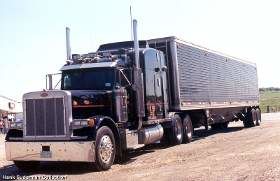Generally Speaking, How Well Are Dispatchers Paid?
Topic 19301 | Page 2
Come on old school let's be honest, you thought this was the greatest retirement you could give yourself. Travel the country, stay physical fit and young at heart. All the while not having to touch your retirement investments, lol. Just pickin ol' boy

I want to add this; all of the Swift DMs I have worked with, our safety manager, the terminal manager and one of the planners are former drivers on the Walmart account.
Unless there has been a policy change, Swift prefers to promote drivers to DMs. Not always the case, but I know it's a preferred approach.
Terminal:
A facility where trucking companies operate out of, or their "home base" if you will. A lot of major companies have multiple terminals around the country which usually consist of the main office building, a drop lot for trailers, and sometimes a repair shop and wash facilities.
Dm:
Dispatcher, Fleet Manager, Driver Manager
The primary person a driver communicates with at his/her company. A dispatcher can play many roles, depending on the company's structure. Dispatchers may assign freight, file requests for home time, relay messages between the driver and management, inform customer service of any delays, change appointment times, and report information to the load planners.
I'm sure many drivers use driving as a stepping stone into a more desirable career for them
Those words "more desirable" are relative to one's personality and interests. I've met both a former attorney, and a dentist who are now happily driving OTR.
I myself transitioned into this from thirty years of business ownership.
I'm with old school here. This is not a job its a complete lifestyle change from "normal" jobs. I went into the terminal last month for a few days of classes and having a regimented schedule of 0700, lunch at 1200, end of day at 1700 drove me crazy.....omg I could never go back to a normal job. With people telling me what to do all day???? And having to rely on co workers who are lazy bums???? Dealing with supervisors who don't know their own jobs let alone mine??
No thank you. I have a degree, am a published author and a recipient of the Hugh O'Brien Community Service Award. I left 18 years of federal employment and will N-E-V-E-R go back.
Terminal:
A facility where trucking companies operate out of, or their "home base" if you will. A lot of major companies have multiple terminals around the country which usually consist of the main office building, a drop lot for trailers, and sometimes a repair shop and wash facilities.
OTR:
Over The Road
OTR driving normally means you'll be hauling freight to various customers throughout your company's hauling region. It often entails being gone from home for two to three weeks at a time.
HOS:
Hours Of Service
HOS refers to the logbook hours of service regulations.
The thing about dispatchers is they all have there own way of running their fleet. My dispatcher takes a really hands off approach with me, he gives me a load, I either accept it or reject it and down the road I go. I can count on one hand the amount of loads I've rejected in 2 1/2 years. If my dispatcher calls me it's usually for special instructions for the load.
I make all the calls when it comes to trip planning. Where I stop for fuel, showers, downtime etc. I figure if he doesn't contact me nothing is wrong. Anytime I need to get a question answered or have to give him some information I just write him a quick note on the QC. He usually gets back to me pretty quick.
Overall I thing he and I are on the same page. Shoot I even made driver of the fleet a couple of times so I guess it's all cool.
Dispatcher:
Dispatcher, Fleet Manager, Driver Manager
The primary person a driver communicates with at his/her company. A dispatcher can play many roles, depending on the company's structure. Dispatchers may assign freight, file requests for home time, relay messages between the driver and management, inform customer service of any delays, change appointment times, and report information to the load planners.Actually this is unusual.
Very few drivers transition into other trucking related jobs. It does happen, but far less than you'd expect. Once a company finds a good driver they do everything they can to keep them in that job.
At Swift most of the dispatchers I've met, including all but one of the dispatchers I've had, used to be drivers. I just took it for granted that was common in the industry.
Dispatcher:
Dispatcher, Fleet Manager, Driver Manager
The primary person a driver communicates with at his/her company. A dispatcher can play many roles, depending on the company's structure. Dispatchers may assign freight, file requests for home time, relay messages between the driver and management, inform customer service of any delays, change appointment times, and report information to the load planners.New Reply:
New! Check out our help videos for a better understanding of our forum features

















Preview:








 TT On Facebook
TT On Facebook
Those words "more desirable" are relative to one's personality and interests. I've met both a former attorney, and a dentist who are now happily driving OTR.
I myself transitioned into this from thirty years of business ownership.
OTR:
Over The Road
OTR driving normally means you'll be hauling freight to various customers throughout your company's hauling region. It often entails being gone from home for two to three weeks at a time.
HOS:
Hours Of Service
HOS refers to the logbook hours of service regulations.